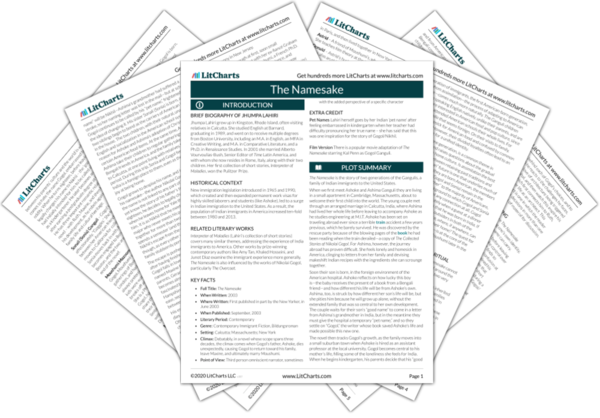Moushumi Mazoomdar Quotes in The Namesake
It strikes him that there is no term for what they once were to each other. Their parents were friends, not they. She is a family acquaintance but she is not family. Their contact until tonight has been artificial, imposed, something like his relationship to his cousins in India but lacking even the justification of blood ties. Until they’d met tonight, he had never seen her outside the context of her family, or she his. He decides that it is her very familiarity that makes him curious about her, and as he begins to walk west, to the subway, he wonders when he might see her again.
He’d confessed to her that he still felt guilty at times for changing his name, more so now that his father was dead. And she’d assured him that it was understandable, that anyone in his place would have done the same. But now it’s become a joke to her. Suddenly he regrets having ever told Moushumi; he wonders whether she’ll proclaim the story of his father’s accident to the table as well. By morning, half the people in the room will have forgotten. It will be a tiny, odd fact about him, an anecdote, perhaps, for a future dinner party. This is what upsets him most.
She believed that he would be incapable of hurting her as Graham had. After years of clandestine relationships, it felt refreshing to court in a fishbowl, to have the support of her parents from the very start, the inevitability of an unquestioned future, of marriage, drawing them along. And yet the familiarity that had once drawn her to him has begun to keep her at bay. Though she knows it’s not his fault, she can’t help but associate him, at times, with a sense of resignation, with the very life she has resisted, has struggled so mightily to leave behind.
She wonders if she is the only woman in her family ever to have betrayed her husband, to have been unfaithful. This is what upsets her most to admit: that the affair causes her to feel strangely at peace, the complication of it calming her, structuring her day.
It is as if a building he’d been responsible for designing had collapsed for all to see. And yet he can’t really blame her. They had both acted on the same impulse, that was their mistake. They had both sought comfort in each other, in their shared world, perhaps for the sake of novelty, or out of fear that that world was slowly dying. Still, he wonders how he’s arrived at all this… His time with her seems like a permanent part of him that no longer has any relevance, or currency. As if that time were a name he’d ceased to use.

Moushumi Mazoomdar Quotes in The Namesake
It strikes him that there is no term for what they once were to each other. Their parents were friends, not they. She is a family acquaintance but she is not family. Their contact until tonight has been artificial, imposed, something like his relationship to his cousins in India but lacking even the justification of blood ties. Until they’d met tonight, he had never seen her outside the context of her family, or she his. He decides that it is her very familiarity that makes him curious about her, and as he begins to walk west, to the subway, he wonders when he might see her again.
He’d confessed to her that he still felt guilty at times for changing his name, more so now that his father was dead. And she’d assured him that it was understandable, that anyone in his place would have done the same. But now it’s become a joke to her. Suddenly he regrets having ever told Moushumi; he wonders whether she’ll proclaim the story of his father’s accident to the table as well. By morning, half the people in the room will have forgotten. It will be a tiny, odd fact about him, an anecdote, perhaps, for a future dinner party. This is what upsets him most.
She believed that he would be incapable of hurting her as Graham had. After years of clandestine relationships, it felt refreshing to court in a fishbowl, to have the support of her parents from the very start, the inevitability of an unquestioned future, of marriage, drawing them along. And yet the familiarity that had once drawn her to him has begun to keep her at bay. Though she knows it’s not his fault, she can’t help but associate him, at times, with a sense of resignation, with the very life she has resisted, has struggled so mightily to leave behind.
She wonders if she is the only woman in her family ever to have betrayed her husband, to have been unfaithful. This is what upsets her most to admit: that the affair causes her to feel strangely at peace, the complication of it calming her, structuring her day.
It is as if a building he’d been responsible for designing had collapsed for all to see. And yet he can’t really blame her. They had both acted on the same impulse, that was their mistake. They had both sought comfort in each other, in their shared world, perhaps for the sake of novelty, or out of fear that that world was slowly dying. Still, he wonders how he’s arrived at all this… His time with her seems like a permanent part of him that no longer has any relevance, or currency. As if that time were a name he’d ceased to use.











